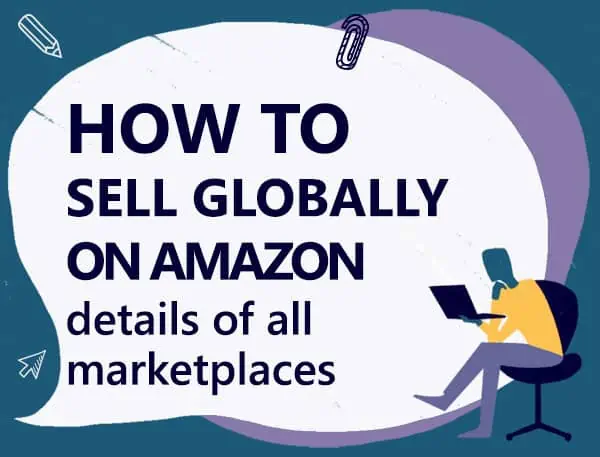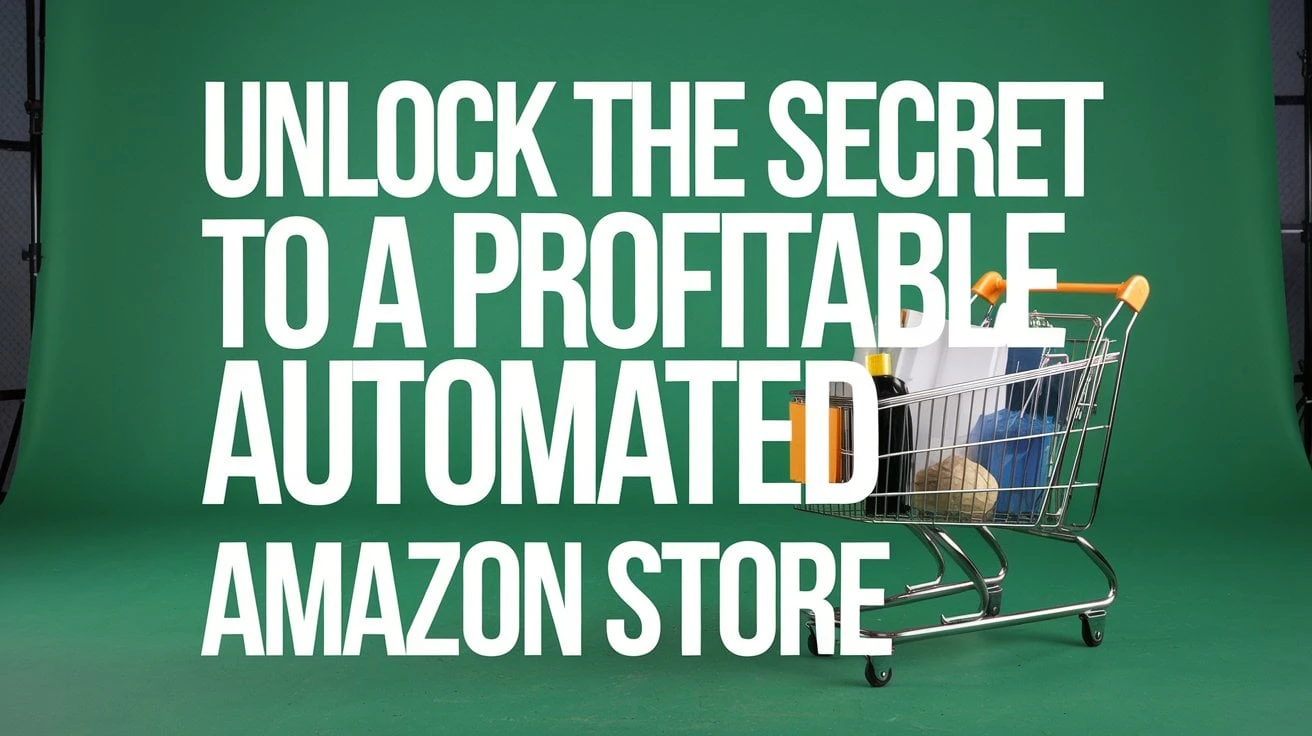What you’ll learn
Imagine being able to sell your products in 13 countries while running everything from the comfort of your office. Amazon allows you to reach a global market through the Amazon Global Selling (AGS) program.
Amazon Global Selling is a program that lets you list and sell your products across the marketplaces run by Amazon around the world. The Amazon Global Selling program allows you to scale and expand your businesses to reach a global audience regardless of location without a physical presence in those countries.

Why sell globally on Amazon?

An example is selling in Europe. If you already sell in the EU, then you likely have physical inventory stored in the Netherlands, Germany or UK. Ever since Brexit, many sellers moved their inventory to NL or DE.
From either NL or DE, the inventory is shipped to other EU countries like Spain or Italy. You don’t have to physically ship your inventory to a fulfillment center in Spain or Italy. This is called Pan-EU, where inventory from one country is used to fulfill orders from another country.
You’ll receive payment in the currency of the shopper. In this example, you’ll receive Euros in your Amazon.it seller central account if a shopper from Italy purchases your product.
The same thing is for North America. Any continent with neighboring countries is super easy.
This is the best part of Amazon’s global selling network.
You don’t have to speak or understand German, Spanish, or French to sell in these countries. You don’t need a physical presence in each country. Your listings are translated into the native language. It won’t be great, but it’s an easy start.
The most important thing is to make sure you are registered for taxes in each country you sell in. More on this towards the end.
Sell globally on Amazon – Can you sell in multiple countries?
Yes, you can sell in multiple countries on Amazon. But you must maintain an active account in those marketplaces, except when using a unified account. Also, Amazon charges a monthly fee for every account that you hold. The fee differs depending on the marketplace due to currency conversions.
The monthly fees charged by Amazon in different marketplaces are:
- United States: $39.99 USD
- Australia: $49.95 AUS
- Japan: 4,900 JPY
- Spain: 39 EUR
- Italy: 39 EUR
- United Kingdom: 25 GBP
- France: 39 EUR
- Germany: 39 EUR
- Brazil: 19 R$
- Mexico: 600 MXN
- Canada: 29.99 CAD
What countries can you sell in via Amazon FBA?
The countries included in the Amazon global selling program are:
North America
- Mexico – Amazon.com.mx
- Canada – Amazon.ca
- United States – Amazon.com
- Brazil – Amazon.com.br
Asia & Pacific
- India – Amazon.in
- Japan – Amazon.co.jp
- China – Amazon.cn
- Australia – Amazon.com.au
- Singapore – Amazon.sg
Europe
- Germany – Amazon.de
- United Kingdom – Amazon.co.uk
- France – Amazon.fr
- Spain – Amazon.es
- Italy – Amazon.it
Middle East
- United Emirates – Amazon.ae
Benefits of global selling

Selling globally on Amazon comes with lots of benefits, including:
#1. Wider customer base
Amazon global selling allows you to be part of different marketplaces; thus, you have a wider customer base to sell your products to. With just one unified account, you can reach out to millions of potential buyers across different regions of the world.
#2. FBA advantage
Being a part of Amazon global selling gives you an edge over the competition. You won’t bother with international shipping and customer service. Ship your pallet to an Amazon fulfillment center and they take care of logistics.
#3. Increased sales during festivals
Whether Black Friday, Christmas or Cyber Monday, Amazon global selling gives you a platform to boost your sales during festival celebrations worldwide. So it’s not just a single marketplace holiday. You can take advantage of India festivals, Australia Day, Canada holidays, etc. It’s a holiday promotion year-round.
Amazon International Selling Fees
There are some fees to keep in mind as you look to sell globally on Amazon. These fees include:
- Shipping fee: This is the fee you would pay for shipping your goods and inventories across borders. You can use our FBA Calculator for container unit calculations and more.
- FBA fees: You’ll pay fees for every marketplace unit you sell. Same for all marketplaces.
- VAT, Taxes, duties, and customs: I will explain this in detail in the next section.
Important facts to sell globally on Amazon
EU Required business documents (general requirements)
- Submit your business formation/registration document, such as your articles of incorporation, articles of organization, or fictitious name statement for sole proprietorships.
- The registration date entered in the Seller Central account must match the registration date listed in the business registration extract.
- Business Bylaws or Statutes: Certificate of Existence or Good Standing.
- Operating Agreement: Please obtain this from your state if the business registration paperwork does not specify a share allotment for the owners.
- If your state does not issue this, please email [email protected] to let them know that you will create and upload a statement verifying the ownership information, even though your state does not offer a formal document in this regard.
- Upload a bank statement or utility bills for your business, such as gas, electric, internet, or phone bill. You can obscure account balances, but all other information, including the date of the statement, must be readable. The utility bill or bank statement’s business name and address must coincide with the information recorded in Seller Central.
- Be sure to carefully read the performance notification email’s instructions before uploading any further files. You must use the email address you used to sign up for a UK Seller Central account when contacting the Seller verification team.
- Emails sent to addresses other than the one used to create the account will not receive a response from the Seller Verification team.
- Important: If additional papers are required, the Seller Verification team will email the Point of Contact on the account; be sure to include that email address.
Understand registration requirements per marketplace
Understand the Amazon marketplaces and the requirements to register on those marketplaces. Below, I have outlined the registration requirements in each region.
#1. North America Marketplace
- Countries: US, Canada, and Mexico
- Required documents: Tax ID, valid credit card, bank account details, and mobile number. The registration may require additional documents like credit card statements, passports, national IDs, or bank account statements to verify the name and address matches.
#2. Europe Marketplace
- Countries: Germany, UK, Poland, France, Italy, Spain, Netherlands, Sweden.
- Required documents: Tax information, valid credit card, bank account information, and phone number. Most importantly, you need a VAT number for every marketplace you sell in Europe.
India is categorized as part of the European marketplace. We know this because the Amazon API for India uses the EU connection.
- Country: India
- Required documents: Currently, the Indian marketplace is only open to those with a locally-based business.
#3. Pacific-Asia Marketplace
- Country: Japan
- Required documents: The documents required to participate in the Pacific Asia marketplace for the initial registration are the same as those I have highlighted above. However, you will need to submit additional documents like a resident registration card, driver’s license, or at least a passport to be verified. The Japanese authorities require that every international seller must have a local business address for customer returns. Japanese laws also require that you list your business information on your profile page.
- Country: Australia
- Required documents: The AU marketplace requires that you submit your tax information, valid credit card, bank account details, and mobile number. Other information includes passport, bank account statements, or scanned copies of national ID.
- Country: Singapore
- Required documents: To participate in the Singapore marketplace, you will need to provide the same documents as required in the AU marketplace above.
#4. Middle East Marketplace
- Countries: The United Arab Emirates and Turkey
- Required Documents: Operating in the Middle East marketplace requires that you submit your tax information, valid credit card, bank account details, and mobile number. Additional information includes national ID, passport, or bank account statements.
Information required to register as a selling partner with Amazon EU shops
- Primary Point of Contact: The person handling day-to-day operations and disbursing money from the Seller Central account is the Primary Point of Contact.
- Add beneficial business owners who hold 25% or more of the shares to the Seller Central account. You’ll get a prompt occasionally to add someone who owns 20% or more of the account.
- *First name (including middle names) and surname fields: Please fill out the first name (including middle names) and surname fields with your complete names. You must enter the whole legal name shown exactly on the identity document.
Enable your account for Amazon global selling

Creating or registering a seller account sets you on track to start selling internationally on Amazon. Visit https://sellercentral.amazon.com/ to create a seller account for free. If you already have a seller account, you must create a new account in your target marketplace.
Go to “Inventory” and click on “Sell Global.” You will see different tabs directing you to each marketplace. Click on your target marketplace and register as a seller in the marketplace. After registering as a seller in your target marketplace, click on the “Link accounts” tab to link your current account to your target accounts. This lets you manage multiple accounts in the same region from your seller account interface.
Please note that those who have an account in Europe or North America have exclusive access to unified account features. You will access other countries in your region through a single account without additional fees.
For example, suppose you have a unified seller account in the US. You can link your EU, AUS, JP and other accounts through a single login. Rather than pay a fee for each marketplace, it’s all included in 1 monthly fee.
A unified seller account doesn’t mean your product listing will automatically appear in these marketplaces. You will have to optimize your listing in each of your target markets.
Seller Identification Verification, Know Your Customer – Europe only
Once you have successfully created an account and optimized your listing, Amazon will conduct a seller identification verification before you start to sell. The verification aims to let Amazon know the sellers on their European marketplaces. Then, when you have made up to €15,000 in sales, Amazon will conduct a second verification known as “the know your customer” vetting. The know your customer verification is an important requirement in the EU.
Create international listings
Amazon offers the “Build international listings” option within the global selling dashboard. However, thoroughly check the language translation, as Amazon uses artificial intelligence to translate product listings. You can use reverse translation to double-check whether the machine properly translates your content to the local language of your target market.
Best to hire someone cheap from Upwork to check the translations or do it for you.
Amazon global selling doesn’t allow bulk listing of products across different marketplaces. If you target more than one marketplace, you will have to list your products one at a time. Adding relevant keywords in the local language for each marketplace is crucial to rank your listing organically.
Taxes and customs
Taxes and customs are usually complicated issues when selling outside your domestic market. The taxes that you’d pay differ depending on your target marketplace. Therefore, you must understand the requirements for selling in your target marketplace.
Importer of Record (IOR)
You need an importer of record (IOR) to sell in Japan and Europe. An importer of record is responsible for paying taxes and other applicable import duties. The person will also ensure that all the products imported into your target country comply with local regulations. An importer of record must be resident in Japan and Europe, and the authorities won’t like it otherwise. Please note that Amazon or any of its fulfillment centers will not act as your importer of record when shipping inventory to your target market.
Non-Resident Importer
If you find it difficult to get someone to serve as your importer of record, you can engage the services of an Attorney for Customs Procedures (ACP) to help you with things like tax and duty payments. An Attorney for Customs Procedures (ACP) is only responsible for paying taxes and duties and will not satisfy other IOR’s responsibilities. So, you should find other ways to ensure that your products or goods comply with the local laws in your target marketplace.
Value Added Tax (VAT) – Europe only
When selling in any European Union country, you must register for the value-added or consumer spending tax (VAT). You can check the Amazon Service Provider Network to get resources to help you manage Europe’s VAT requirements.
Import consumption tax – Japan Only
If your target market is Japan, keep in mind that you’d pay an import consumption tax to the authorities in the country before you can start selling. The amount to be paid depends on excise taxes, customs duty, and the customs value of your goods.
Destination duties, taxes, and customs clearance – Canada, Australia
Whether you are a Canadian seller or not, be prepared to pay destination duties, taxes, and custom clearance fees to operate freely in Canada. Canadian authorities charge 5% for most imports plus duty, and some provinces even charge Harmonised Sales Tax (HST) or Goods and Service Tax (GST).
How to manage EU VAT
EU countries collect VAT on trade, imports, and goods moving inside the EU countries.
VAT registration is a must in an EU nation if you keep products in the territory or sell them to customers there. While it is primarily the responsibility of each Amazon seller to comply with VAT laws, Amazon can give tools and resources for your VAT filings and registrations in EU countries. This also entails giving contact information on third-party tax advising services. Do note that they have pre-negotiated discounted rates.
You can use this website to know where you need your VAT registered.
The length of time it takes to register for VAT can change. We advise that you begin the process of requesting immediately after creating your EU seller account.
You may need the following documents for your VAT registration:
- The company’s articles of association.
- A letter stating that you have an account with your bank.
- Power of Attorney for your tax advisor, if you have one. In some nations, you may also need additional paperwork such as proof of address and government-issued identification for business proprietors.
Are you concerned about VAT? Use Amazon’s VAT Services or the Solution Provider Network to locate a tax service provider.
Thanks to Amazon’s VAT services, you can spend more time working on your business and less time on VAT. With VATServices on Amazon, you can perform VATregistration, filing, and submission in Seller Central, the gateway that gives you control over your Amazon seller account, for as little as €400 per country per year. To offer this service in the United Kingdom, Germany, France, Italy, Spain, Poland, and the Czech Republic, Amazon collaborates with a third-party global tax service vendor.
Since these nations do not require fiscal representation, the UK, Germany, and the Czech Republic now permit VAT registration and filings from non-EU-based vendors. Services for other nations’ VAT financial representation that you need will be accessible soon.
The person or local legal organization (depending on jurisdiction) tasked with representing non-EU vendors before tax authorities is known as a fiscal representative. For VAT payment, fiscal representatives and sellers are held jointly accountable.
Conclusion
Selling internationally on Amazon can be very lucrative as you will reach more customers to sell your products. The downside is that there are a lot of fees and taxes you need to include in your margins.
You will reach new marketplaces quickly, but to be successful, you need robust knowledge of how the global market works and cultural norms.
FAQ – Frequently Asked Questions
Is it worth it to sell internationally on Amazon?
The different marketplaces allow you to access a wider customer base. However, Amazon’s global selling is not a direct ticket to immediate success or wealth. There are lots of fees and costs to send your product to another country and new tax laws you must know.
Which countries can sell on Amazon.com US marketplace?
Amazon sellers from more than 200 countries can access Amazon U.S. If your country is in the list of eligible countries to sell in the US, you will need to register your business, create a local bank account, and obey the rules and regulations of selling internationally on Amazon. If all of these things are unavailable, you won’t be able to sell in the US.
What is Amazon global listing?
Amazon global listing is a program designed by Amazon to enable sellers to sell their products on any of its marketplaces. With about 16 marketplaces in its fold, you can register and list your products on any of the marketplaces without leaving the country. In other words, whether you are in the US, Asia, or Europe, Amazon global listing lets you access any of the Amazon marketplaces.
Can I do Amazon FBA in any country?
Yes, you can register for the FBA program while you sell globally. Amazon FBA enables Amazon to be in charge of its logistics and customer service. However, if you choose to handle product shipping and customer support by yourself, there’s a limit to the country you can penetrate. In other words, you may not have the supporting structure to sell in certain countries.
Comments
One response to “How to Sell Globally on Amazon”
-
Do you provide services to help me get from my US seller to Global?
Related Posts
Mastering Shopify’s UTMs: The Simple Way to Smarter Marketing
Let’s be honest: marketing your Shopify store without tracking what’s…

10 Profitable Product Categories for Amazon Affiliates 2025
What you’ll learn Amazon is a favorite for experienced and…

Unlock the Secret to a Profitable Automated Amazon Store: How to Build a Hands-Free Income Stream
Ever dreamed of running a profitable Amazon business while sipping…






Leave a Reply